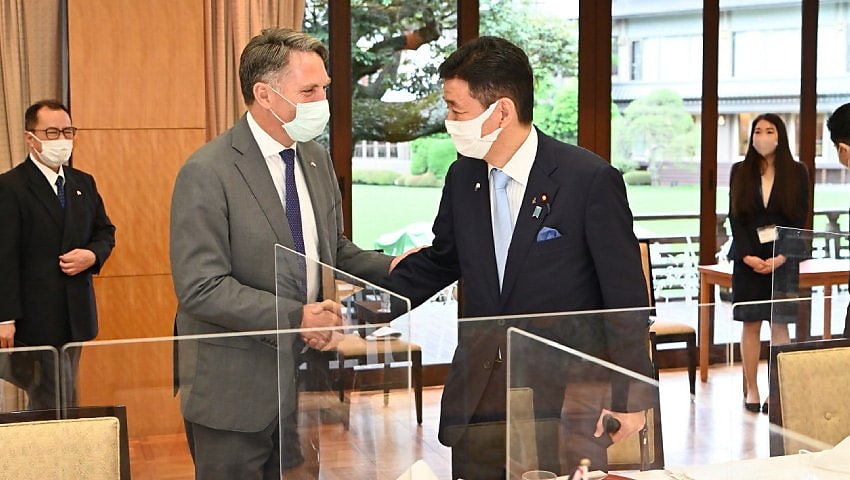The regional partners have agreed to increase the frequency and magnitude of joint military engagements across all warfighting domains.
Deputy Prime Minister and Minister for Defence Richard Marles has announced a new commitment to strengthening defence ties between Australia and Japan amid mounting tensions in the Indo-Pacific.
A joint statement was issued following a meeting between Minister Marles and Japanese Minister of Defense Kishi Nobuo in Tokyo, outlining plans to “elevate defence cooperation” under the Japan-Australia Reciprocal Access Agreement.
Other measures include:
- increasing the sophistication of exercises and activities across all warfighting domain to improve interoperability;
- advancing cooperation on science and technology, and strategic capabilities, while also accelerating work on the development of a framework to promote cooperation between the Acquisition, Technology & Logistics Agency and Defence Science and Technology Group;
- increasing cooperation across space and cyber;
- strengthening mutual industrial bases through collaboration on supply chains; and
- enhancing coordination of activities alongside Pacific and ASEAN partners.
“The ministers resolved to continue their close bilateral coordination in regional engagement, with the aim of contributing to a free, open, secure and prosperous Indo-Pacific and maintaining the rules-based international order,” the joint statement read.
The bilateral meeting followed a Trilateral Defense Ministerial Meeting during the recent 2022 Shangri-La Dialogue.
Minister Marles and Minister Kishi joined US Secretary of Defense Lloyd Austin III to reaffirm their continued support for the rules-based order and the UN Charter.
The trio condemned Russia’s violation of international law through the invasion of Ukraine, calling on Moscow to comply with the International Court of Justice’s legal order issued on 16 March.
Late last month, a Quad leaders’ meeting was also held between Prime Minister Anthony Albanese, Japanese Prime Minister Fumio Kishida, Indian Prime Minister Narendra Modi, and US President Joe Biden.
These regional security discussions come amid continued instability in the region.
Defence recently reported an incident in which a People’s Liberation Army Air Force (PLAAF) Shenyang J-16 strike fighter intercepted a Royal Australian Air Force (RAAF) P-8 Poseidon conducting “routine maritime surveillance activity” in international airspace over the South China Sea.
During the incident, which took place on 26 May, the fighter jet cut across the nose of the Australian surveillance platform, releasing a “bundle of chaff” ingested into the RAAF aircraft’s engine.
The “very dangerous” manoeuvre was condemned by Defence Minister Richard Marles, who said it would not deter the RAAF from conducting future missions over disputed territory.
Prime Minister Albanese later revealed the government had made “appropriate representations” to the Chinese government expressing concern over the incident.
On the same day, a Chinese aircraft confronted a Canadian military aircraft enforcing United Nations sanctions along the border with North Korea, failing to adhere to international air safety norms.
These incidents came just days after Chinese and Russian bombers flew over the Sea of Japan and East China Sea during the Quad leaders’ meeting in Tokyo.
[Related: Defence Ministers collaborate during Trilateral Defense Ministerial Meeting]


